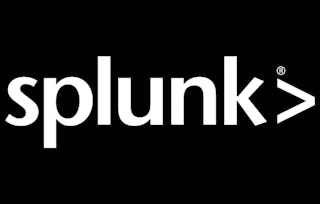In this course, you will learn how fields are extracted and how to create regex and delimited field extractions. You will upload and define lookups, create automatic lookups, and use advanced lookup options. You will learn about datasets, designing data models, and using the Pivot editor. You’ll improve search performance by creating efficient base searches, accelerating reports and data models, and how to use the tstats command.

Splunk Knowledge Manager 102

Splunk Knowledge Manager 102
This course is part of Splunk Knowledge Manager Specialization

Instructor: Splunk Instructor
Included with
14 reviews
What you'll learn
Learn how to perform different types of regex and delimited field extractions and when the field extraction process occurs.
Define, create, and use file-based lookups and identify where lookups fall in the search-time operation sequence.
Add event, search, and transaction datasets to data models and learn how to work with Pivots by creating, configuring, and visualizing a Pivot.
Understand how search modes affect performance by defining and using acceleration and acceleration types.
Skills you'll gain
Details to know

Add to your LinkedIn profile
4 assignments
See how employees at top companies are mastering in-demand skills

Build your subject-matter expertise
- Learn new concepts from industry experts
- Gain a foundational understanding of a subject or tool
- Develop job-relevant skills with hands-on projects
- Earn a shareable career certificate

There are 4 modules in this course
This module is for knowledge managers who want to learn about field extraction and the Field Extractor (FX) utility. Topics will cover when certain fields are extracted and how to use the FX to create regex and delimited field extractions.
What's included
5 videos2 readings1 assignment
This module is for knowledge managers who want to use lookups to enrich their search environment. Topics will introduce lookup types and cover how to upload and define lookups, create automatic lookups, and use advanced lookup options. Additionally, students will learn how to verify lookup contents in search and review.
What's included
10 videos2 readings1 assignment
This module is for knowledge managers who want to learn how to create and accelerate data models. Topics will cover datasets, designing data models, using the Pivot editor, and accelerating data models.
What's included
5 videos2 readings1 assignment
This module is for users who want to improve search performance. Topics will cover how search modes affect performance, how to create an efficient basic search, how to accelerate reports and data models, and how to use the tstats command to quickly query data.
What's included
7 videos2 readings1 assignment
Earn a career certificate
Add this credential to your LinkedIn profile, resume, or CV. Share it on social media and in your performance review.
Instructor

Offered by
Explore more from Security
 Status: Free Trial
Status: Free TrialSplunk Inc.
 Status: Preview
Status: PreviewCoursera
 Status: Free Trial
Status: Free TrialSplunk Inc.
Why people choose Coursera for their career

Felipe M.

Jennifer J.

Larry W.

Chaitanya A.

Open new doors with Coursera Plus
Unlimited access to 10,000+ world-class courses, hands-on projects, and job-ready certificate programs - all included in your subscription
Advance your career with an online degree
Earn a degree from world-class universities - 100% online
Join over 3,400 global companies that choose Coursera for Business
Upskill your employees to excel in the digital economy
Frequently asked questions
To access the course materials, assignments and to earn a Certificate, you will need to purchase the Certificate experience when you enroll in a course. You can try a Free Trial instead, or apply for Financial Aid. The course may offer 'Full Course, No Certificate' instead. This option lets you see all course materials, submit required assessments, and get a final grade. This also means that you will not be able to purchase a Certificate experience.
When you enroll in the course, you get access to all of the courses in the Specialization, and you earn a certificate when you complete the work. Your electronic Certificate will be added to your Accomplishments page - from there, you can print your Certificate or add it to your LinkedIn profile.
Yes. In select learning programs, you can apply for financial aid or a scholarship if you can’t afford the enrollment fee. If fin aid or scholarship is available for your learning program selection, you’ll find a link to apply on the description page.
More questions
Financial aid available,


